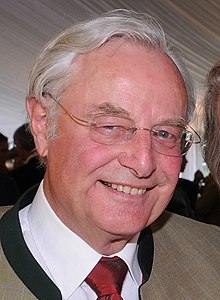Bernhard Wehrens
Bernhard Wehrens (born April 23, 1934 in Hermeskeil ) is a German EU official who worked as Chef de Division for the European Commission in Brussels until his retirement .
Live and act
After his school education at the humanistic Görres-Gymnasium in Koblenz , Bernhard Wehrens studied law in Bonn , Freiburg im Breisgau and Mainz . Following the two state examinations in law, he continued his studies in European law at the Europa-Institut Saarbrücken and successfully applied for a position at what was then the European Economic Community (EEC) in Brussels.
During his more than thirty years of service with the European Commission, he was a. a. deals with the harmonization of company law, the reorganization of the EU legislative procedure under President Jacques Delors , the regulations for the integration of people with disabilities in all areas of life at national and European level, including the introduction of uniform city maps for the blind. He also helped organize the Paralympic Games for disabled athletes in 1992 in Albertville (winter) and Barcelona (summer) on the part of the European Commission.
family
There is also a European spirit in his family: the father of his Dutch wife was a diplomat (ambassador); he speaks mostly French with her; his two daughters talk to each other and to their mother in Dutch or French; in addition, they speak English and Spanish in their professional life and in their free time.
Bernhard Wehrens belongs to the Kockerols family association through the tribe of his paternal grandmother, whose ancestors can be traced back to the end of the 16th century. They come from the area between Hatterath / Kreis Heinsberg, Löwen / Louvain and Antwerp / Anvers, but can now also be found in other European countries and in Australia.
Fonts (selection)
- First European Symposium on Tactual Town Maps for the Blind: General Report , 1983.
- Rehabilitation in the EC. In: Disabled and Rehabilitation, 1991, 179–189 (Campus Verlag Frankfurt / Main).
- Strategies for cooperation with Central and Eastern Europe. For the exchange of information and experience in the field of disability policy based on the HESTIA study. In: Helioscope (1995) 5, p. 20.
- Museums Without Barriers. Fondation de France (Editor), International Committee of Museums (ICOM) (Editor), London, New York 1991.
Individual evidence
- ↑ Keyvan Dahesch: Empty Promises. In: Die Zeit, 12/1996 of March 15, 1996
- ↑ Bettina Kaps: "The path to equal opportunities is very long". In: taz. the daily newspaper of May 27, 1992
- ↑ Gerda Otten-Borgs: Chronicle of the Kockerols Family, 1595 to 2003, data - pictures - stories. Mönchengladbach 2004
- ↑ Victor Kockerols: Origine du nom et de la famille Kockerols. B-5020 Malonne
| personal data | |
|---|---|
| SURNAME | Wehrens, Bernhard |
| ALTERNATIVE NAMES | Wehrens, Bernhard Maria (full name) |
| BRIEF DESCRIPTION | German EU official |
| DATE OF BIRTH | April 23, 1934 |
| PLACE OF BIRTH | Hermeskeil |
